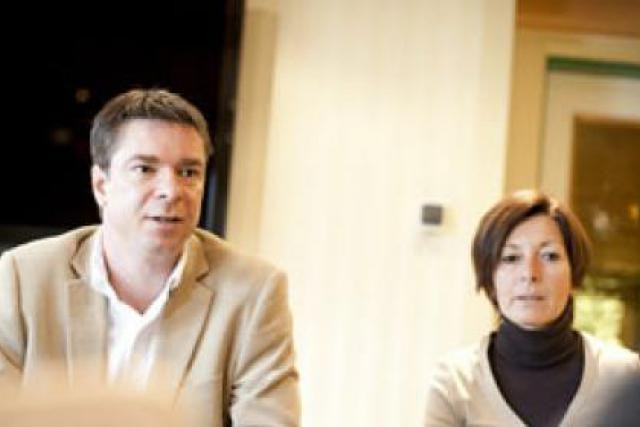A sign in the parking lot reminds waiting lorry drivers to cut their motors. Chemicals used on the factory floor are stored in safety cages fitted with metal basins to capture any accidental spillage. More than 10 tonnes of bottle caps are recycled annually. Separately these may seem like small steps. Taken together they are part of a rich tapestry of environmentally friendly measures that have earned local mineral water company Sources Rosport numerous ecological accolades, most recently the International Organization for Standardization’s ISO 14001:2004 certificate, the global benchmark for environmental management systems. Yet despite the economic downturn, being green has helped the company outperform its much larger French and Swiss rivals in the Luxembourg market.
The industry research firm Beverage Marketing Corporation estimates 149.5 litres of bottled water were consumed per capita in Luxembourg (which was surveyed with Belgium) in 2007 (the most recent figures available), up from 123.8 litres in 2002. This gives the Grand Duchy the fourth highest consumption rate globally after the United Arab Emirates, Mexico and Italy. So, naturally major global players – such as Nestlé, with its Perrier, San Pellegrino and Vittel brands, and Danone, with Badoit, Evian and Volvic – are attracted to the Luxembourg market.
To stake-out its market share, Sources Rosport has pursued a purely local strategy, which also happens to make it the greenest player in the Grand Duchy, according to the company’s newly appointed Managing Director, Max Weber. First, its Rosport and Viva brands are only distributed in Luxembourg, which limits both transport costs and CO2 emissions. At the same time, Weber says the 51-year-old, privately held company – based in Rosport, along the Sauer River in Echternach Canton – has no plans to export its products.
In addition, Sources Rosport still mainly works with reusable glass bottles, while most other brands are only available in “one-way” plastic bottles, which “if you’re lucky it will be recycled,” Weber says. While glass bottles consume more energy during initial production, they can be repurposed 35 times before being taken out of circulation. Weber cites a Rosport-sponsored study that found a brand he describes as a “French green bottle” produces 35 times more CO2 emissions “than the same Luxembourg bottle of bubbly water.” Even when French and Italian firms do use glass, Weber points out the empty bottles travel more than 1,000 kilometres across Europe to be refilled. He calls such transport wasteful. “It is nonsense for foreign water transported across Europe to be consumed in Luxembourg.”
Weber states his company sources approximately 85 percent of all raw materials from local vendors, even if supplies “could be cheaper imported.” He says even imported glass bottles originate from the Greater Region. “All non-Luxembourg-based suppliers are chosen, most importantly, on minimising CO2 footprint.”
Reaping Rewards
Such exacting standards helped the company earn its second coveted ISO certification this year, explains Gerlinde Müller, Quality Manager. Müller spent six months developing a master environmental plan, which spells out each step the firm will take to reduce its environmental impact, such as waste reduction, energy and water conservation, and safety procedures. “We have to look at the production line and identify each potential danger. Then we have to prove the environment couldn’t be damaged” by its production processes.
No claim escapes scrutiny, says Müller. “You have to prove all the paper and plastic you sort is actually recycled.” After reviewing the detailed submission – in Sources Rosport’s case a binder six centimetres thick – ISO inspectors spent two full days at its production facility verifying the firm’s plan.The same attention to detail helped the company garner the “SuperDrecksKëscht fir Betriber”, the Luxembourg government’s quality label for environmentally correct waste management in 2003, ISO 9001:2001 certification, the global standard in quality management systems in 2005, and the prestigious national award, “Le Prix Luxembourgeois de la Qualité” in 2008.
So far the firm’s local, green strategy has bolstered the bottom line. Last year it produced 27 million bottles, representing 14 million litres, up from 25 million bottles and 13 million litres in 2007. “We were the only water company in Luxembourg with double digit growth rates over the past two years,” claims Weber. “We’re confident there’s still a lot of space for a company like ours to grow.”
